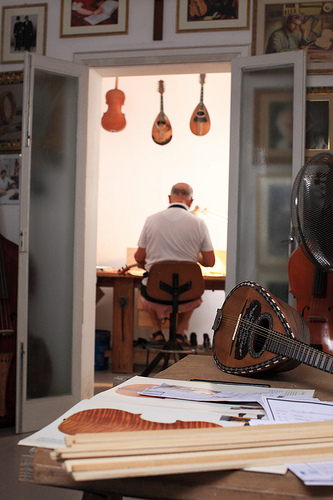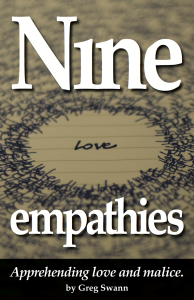
Genius is fueled by midnight oil – by hours and hours of focused, solitary effort.
Photo by: Raffaele Camardella
I wrote it on a Saturday, six years ago today.
It’s not very long, only about a 90-minute read, and I only wrote about two-thirds of the revised length of the book on that Saturday. But I wrote the whole book, start to finish, with subsequent revisions all being interstitial – additions between the lines. I wrote a book that I could have shipped on Saturday, and in fact I did ship it to Amazon’s servers on Monday, long before I was all-the-way happy with it. I shipped successive revisions twice a day after that, until I called Thursday morning’s version the golden master. Then I said, “Hey look. I’m done!” – but in my mind I had been done since the day I started.
What is it that I’m telling you?
I don’t work like you. Most of the people who read me are going to be Cs or Ss in the DISC system. I’m much too wordy for my fellow Ds – and I’m only wordy because I see words as a currency, rather than as a distraction. Even so, I would much rather write a book than read one. I tend to work more outrageously even than other Ds, but my style of working is completely alien to Cs.
I wrote in ten hours what a high-C would have agonized over for ten months – or ten years. Worse, I took off with almost no plan – twelve lines of notes – knowing that I was at least two full epiphanies short of a revelation. “Welcome to Seat-Of-Our-Pants Airlines. If we can’t get you there on time – you’ll never live to tell about it.”
To say the truth, my kind of productivity annoys high-Cs, because it shouldn’t be possible to do this much this well this quickly. They are equally alien to me, in that I can’t fathom working any other way. Their fear of error paralyzes them, where my annoyance at delay infuriates me. Every successful business is built on the energies of high-Ds and high-Cs – but from separate offices. Ds and Cs can never share a metaphorical two-man partner’s desk for long.
Leonard Cohen said, “There is a crack in everything” – a sentiment that makes the world more human, I think. I believe that almost every idea I have will be wrong – a crazy-making notion to a C. I believe that everything I build will be broken – another hair shirt. I don’t hate to be wrong, I just hate to be wrong slowly. I know I’m going to be wrong again and again, but if I am wrong quickly then I am progressively-more-right quickly, and quickly is my favorite ingredient to add to my freshly-picked done.
How do you get things done? Don’t stop. Genius is fueled by midnight oil – by hours and hours of focused, solitary effort. I tend to stop and stretch briefly at the top of every hour. Ice-water, a handful of grapes and back to it. And then I don’t stop until I’m done or stymied. But: When the work is pouring out of me like milk from a pitcher, I do not stop that flow. If I skip a break, I’ll make it up when the magic stops, but this is the magic of working this hard, so I don’t screw it up with trivialities like hunger or weariness.
I’m so D I would forego eating if I could, and I’ve seen shades in the spectrum of tired invisible to most eyes. If your body is tired, press on regardless. If your mind starts to feel loopy but the ideas are still good, force your focus. Your addlepatedness flirts with creativity, while the forced rigor runs the last few drops of gas out of your mental tank. You don’t stop until you cannot do any more useful, productive work – not before.
Then do the opposite, pure fun with no nagging doubts. Sleep. Eat. Repeat. You’ll find your own rhythm, but there is only one rule for getting to the finish line: Don’t stop until you do.
I overdo everything, which is why I stop completely when I stop for the day. I’m all the way D, so I can burn, burn, burn. My peculiar praxis has a time of day, too. I call them the untenanted hours, whenever it is you can be most alone with your mind to pound out real work. I’ll get out of bed anywhere from one to five am, so I have the time before nine to hammer things out. Then I sweep up all of the day’s multi-tasking jobs and knock them down as quickly as possible, then go back to fix the work I did in the morning, soldiering on from there.

The Grand Unifying Theory of Human Motivation – as taught to me by a turtle, and by an eternally-outraged human reptile.
To read more about empathy, see me, feel me, touch me, heal me at Amazon.com.
1. Don’t start until you know all the way to the end what you plan to do. Detailed outline, napkin sketch, I don’t care, but if you can’t answer the question, “What are you doing?” – you don’t know what you’re doing.
2. Do enough to get it all the way working, even if you sock-puppet everything that’s not mission-critical. The name of this job is done. Once you’re done, you’ll be doing a much easier job: Finishing or revising or editing. But you’ll be working on a finished product, and attitude is everything.
3. Find out if you really have an idea. You won’t know until your idea is all the way completed, which is why we rushed to the finish line. Does it work? Is it worth doing? If yes, you’ll know why – and how to proceed. And if not, you didn’t waste weeks polishing pewter.
4. With each iterative revision, aim to amend 70% of the remaining defects, all while never crippling an already-working machine. That means you work by priority, where big functionality matters everything – with the finicky details being something you get right by persistent habit the first time through. In any case, do not fix the hubcaps before the wheels are working. Call each day’s revisions more done. The magic of done comes from the celebration of doneness, and you can never be too happy with what you got done.
5. Rinse and repeat. When you can’t find anything to fix, stop and move on to the next project. If you have a lingering error in there, you’ll find it more easily with distance. Steve Jobs said, “Real artists ship” – and that’s a totally-D way of thinking of work. As a side-benefit, shipped products have end-users to find the errors – the teeny-tiny bugs and the full-on logical blunders – that you may never find on your own.
6. If you don’t know what to do, do something else instead. It can be hard to delay or abandon projects that aren’t working, at least not yet, but it is never the case that things get better by dithering. You’ll know what to do when it’s the right time to do it. Do what’s right right-now while those other ideas quicken.
7. Done is made from doing, nothing else.
How did I write a book on a Saturday? I didn’t start until I was almost finished, and I didn’t stop until I was done. Moreover, I did it by sitting down to write a book – not some notes, not an outline, not a sketch, not a rough draft – a book. I don’t work wrong, anticipating the delight of finding and fixing a host of errors later. I do the best job I can do with every pass through the work, and I call it finished – the highest state of done – when I’m done fixing it.
Do you want to get things done? Forget that high-C ‘control’ and take a deep, refreshing dive into high-D ‘done’ instead.